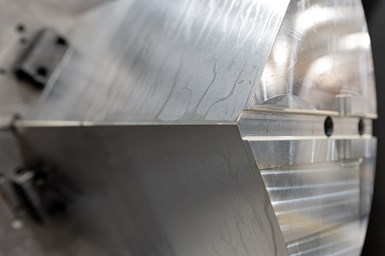Dillon Large-Diameter Full Grip Pie Jaws Designed for Strength, Reliability
Maximum contact area from the full grip jaws is said to provide a solid gripping surface, which yields more friction for drive with reduced part distortion.

Dillon’s extruded aluminum full grip pie jaws. Photo Credit: Dillon Manufacturing
Dillon Manufacturing’s full-grip pie jaws are made from 6061 extruded aluminum and available up to 28" in diameter. Machined from aluminum barstock, the company says these large-diameter full grip pie jaws are stronger and more reliable than cast aluminum, with none of the inherent porosity. These wraparound-type top jaws are said to distribute more of the gripping pressure across the workpiece to reduce part distortion.
Jaw heights of up to 10" are also available and the diameters can also be made larger than the chuck to increase the chuck’s capacity. Maximum contact area from the full grip jaws provides a solid gripping surface which yields more friction for drive with reduced part distortion, the company says. Custom designs are also available with special heights, diameters and configurations, including a matching serration location, which is exactly perpendicular to the slots.
These jaws are manufactured in the U.S. with lead times of typically two weeks or less. The company says the chuck jaws are well suited for high-speed machining, as well as precision boring, tapping, drilling and finishing across a variety of industrial markets. In addition to 6061 extruded aluminum, the jaws are also available in brass, 1018 steel and cast iron.
Standard and custom full-grip jaws are available in serrations of 1.5 mm × 60 degrees, 3.0 mm x 60 degrees, 1/16 × 90 degrees, or 3/32 × 90-degrees, American standard or tongue and groove, Acme and square serrated key-type mounting interfaces. The chuck jaw products are ISO 9000-2015 registered.
Related Content
-
Broaching Tool Technology For Lathes Used to Slot Inconel Parts
This shop finds value in using an indexable-insert-style broaching tool to create blind-hole slots in heat-treated Inconel aerospace parts on a CNC lathe.
-
Starting Small with Automation
Quick-change workholding and flexible robotic automation started this small shop on the path to success.
-
German Project Yields Three New Medical Machining Processes
Recent research has resulted in a new mix of high-speed turn whirl milling, polygon turning and rotational turning for manufacturing medical bone screws and out-of-round nails.










.png;maxWidth=300;quality=90)


